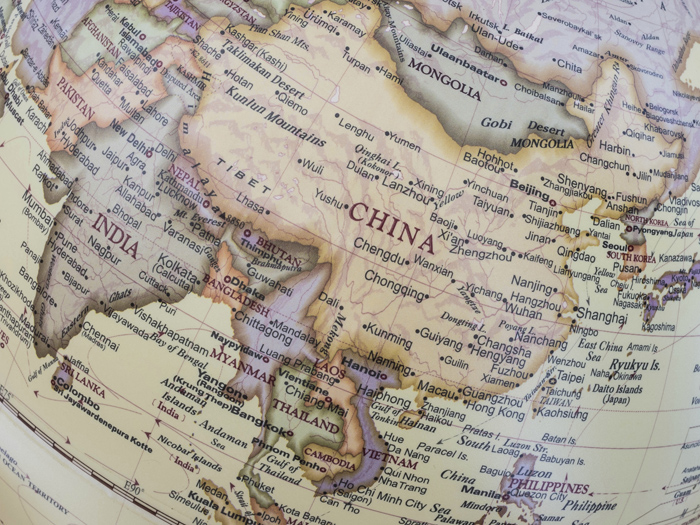Global Expansion
India vs. China

The governments of India and China are vying with one another to attract more foreign capital for their respective insurance industries.
Many observers say that India is best positioned to win that battle.
In a major development, India’s Finance Minister Arun Jaitley recently proposed that foreign companies be allowed to own up to 49 percent of insurance companies in the country. The investment cap currently is 26 percent.
This change could attract billions of dollars for the insurance sector in India, industry officials said.
The insurance sector in India is worth $41 billion and lately has achieved a yearly growth rate of between 32 percent and 34 percent.
The legislation still has to pass, but the change in ownership law is seen by many industry experts as likely to be enacted.
“The industry has been waiting for this for a very long time,” Roopam Asthana, chief executive officer of Liberty Videocon General Insurance, told the Asian Business News.
India opened its insurance sector to private and foreign ownership in 2000, and most of the top international insurers have since entered the market.
The country also has implemented new accounting standards to bring India in line with the standards of the International Financial Reporting Standards.
“This would result in improved quality of financial reporting, which is critical for attracting foreign capital into the country,” Ashish Gupta, partner, Walker Chandick Co. LLP, said in an emailed statement.
Raising Premium Income
In China, meanwhile, the government has announced measures to develop its insurance industry, vowing to raise premium income to 5 percent of GDP by 2020.
The Chinese government has announced measures that will let insurers become “an important pillar of the social security system” instead of their previous role of playing “a supplementary function.”
The measures will let the insurance industry become “an important pillar of the social security system,” according to the State Council of the People’s Republic of China’s “Several Opinions on Accelerating the Development of the Modern Insurance Service Industry,” issued in July.
The state council said that commercial insurance providers will become the primary undertakers of individual and household programs and an important supplier of corporate pensions and health insurance.
Susan Munro and Amy (Yiting) Wang of New York-based Steptoe & Johnson LLP, said that “this is a significant change from the requirement that commercial insurance ‘play a supplementary function’ to the development of the social security system … and signals increased government expectations of insurers’ participation in tackling critical social issues.”
Additionally, insurance companies are being encouraged to support the development of urbanization, major infrastructure construction, and the long-term stable development of the stock and bond markets in China, the pair noted.
“The 2014 ‘Opinions’ also call for improved underwriting of risks for technology companies and research institutes, the vigorous development of credit insurance for small and micro enterprises, loan guarantee insurance for individual consumers and the development of export credit insurance and overseas investment insurance,” they said.
Consistent Growth
In India, the Confederation of Indian Industry stated that the insurance sector of the country has been witnessing a consistent growth rate and its present worth is $41 billion.
The industry of late has achieved a yearly growth rate of between 32 percent and 34 percent, and this makes it the fifth best among emerging economies around the world, according to the CII.
A survey by CII found that 60 percent of non-life insurance companies in India would record an average growth rate of more than 10 percent.
The various entities of the industry are also bringing out newer products on a regular basis to attract customers, the CII added.
One of the major reasons the insurance market in India is attractive is the growing level of awareness about insurance. People nowadays value their lives, their health and their families even more than before, said the CII.
Another reason for the growing popularity of insurance policies in India is the benefit of tax exemption that is provided to family-oriented and individual plans, observed the CII.
Growth in the Indian insurance market is being fueled by the growing population base, rising purchasing power, increasing insurance awareness, increasing domestic savings and rising financial literacy.
The Deloitte consulting firm said that, on the demand side, growth in the Indian insurance market is being fueled by the growing population base, rising purchasing power, increasing insurance awareness, increasing domestic savings and rising financial literacy.
Added Lloyd’s market intelligence team: “Remarkable economic growth is driving the development of new classes of business in the non-life insurance market in India and increasing demand for specialty insurance and reinsurance products.”
“From the period 2009 to 2012, Lloyd’s gross written premium in India grew from $164 million to $245 million,” the insurer said. “The opportunities which exist in India’s insurance market cannot be ignored.”
Chinese Market Participation
With the Chinese government encouraging increased foreign participation in its insurance market, several major international players are exploring the market.
Most recently, the Starr Cos., led by Maurice “Hank” Greenberg, former chief executive of American International Group Inc., has taken a 93 percent stake in Shanghai-based Dazhong Insurance Co. Ltd. of China.
The deal was described by Dazhong as the first foreign takeover of a state-backed Chinese general insurer. The Chinese insurer will be known as Starr Property & Casualty Insurance (China) Co. Ltd. or Starr China.
In a statement, New York-based Starr Cos. said it will expand the Chinese insurer’s product portfolio beyond its existing auto insurance programs “with an array of commercial property and casualty products. Chinese corporations and businesses will be able to access secure coverage for various exposures such as accident and health insurance, political risk, financial and management liability.”
Warren Buffett is also exploring the Asian market.
Buffett’s Omaha, Neb.-based Berkshire Hathaway has hired Marc Breuil, who previously headed AIG’s operations in Hong Kong and Taiwan, and Marcus Portbury, who was the head of casualty for the Asia-Pacific region, according to Dow Jones, citing persons with knowledge of the hires.
The hires “are part of the investment firm’s effort to build a commercial coverage business in Asia,” Dow Jones added.
Right now, though, the insurance battle between India and China is being won by India, most observers noted.
India’s diverse free-market private sector and relatively free legal and political system give the nation enormous advantages over China, said economist A. Gary Shilling, president of Springfield, N.J.-based A. Gary Shilling & Co., Inc., economic consultants and publishers of the monthly newsletter “Insight.”
“India has the basis for a strong economic future,” Shilling said. “They’ve got a democratic government, they’ve got the rule of law and they’ve got corporations that are private businesses; they’re not huge state companies like in China.”
Shilling added that China is a top-down economy and that private companies, by and large, are very small and unable to compete internationally, whereas in India they are.
Shilling also noted that India is the world’s largest democracy in terms of numbers. “And they speak English, which in today’s world that’s where the action is,” he said.
“In the long run,” he said, “and it may be many years, but I’d bet on India over China.”










